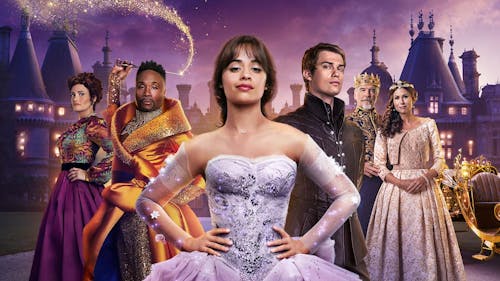Nice try, Amazon: Camilla Cabello's 'Cinderella' is still super sexist

When you think of feminist cinema, I doubt “Cinderella” comes to mind.
The original cartoon — and, by extension, its incredibly similar 2015 live-action counterpart that launched a hundred other live-action Disney adaptations — has received mountains of criticism over the years that it is, at its core, unfeminist.
The claim lies within the plotline of "Cinderella," where, in case you’ve been living under a rock since childhood, an orphaned girl tormented by her stepmother and stepsisters gets the chance to attend a ball, where her romantic connection with the prince plucks her out of poverty and into her happily ever after.
And on a surface level, this is true: the idea of a woman needing to be rescued by a man is one that carries deeply sexist implications.
Through the lens that the film was made in 1950, based on a fairytale from many, many years prior, things get a little bit better, and to an optimist, Amazon’s “Cinderella” is the triumphant story of a young woman falling in love despite her differences with the love interest. She gets a chance to escape an abusive situation and live a life of luxury with someone who saw her when no one else did.
No matter how one views the original story or the more faithful adaptations since, one thing rings clear: no one asked for girlboss Cinderella.
And yet, we were given it.
If you’re unfamiliar, a "girlboss" is someone who, while lauded as a feminist icon, participates in inherently unfeminist actions.
A girlboss is the female CEO who makes a billion dollars more than her male counterparts while exploiting workers.
A girlboss is a white, straight, female celebrity who laments her struggles as a woman in the industry but remains silent on anything revolving around queer women or women of color.
A girlboss, in this negative, unfeminist sense, is a capitalist, elitist mess of a woman who just happens to be wearing a pencil skirt and slapping an “I’m With Her!” bumper sticker on her hybrid car.
It’s unfair to say that Cabello’s (herself, a bit of a girlboss pick for the role, considering her racist past) Cinderella is abusing workers and hoarding wealth in the darkest sense of what a girlboss is considered.
But the notion of love being inherently "unfeminist" — something seen in every battle cry of “why does she need a man?” the second a strong woman is shown affection from the opposite sex — is not as progressive as one might think.
Cinderella herself is not the issue. If she wants to have her dress shop (the main plot of the 2021 musical adaptation), thrive and have her prince on the back burner (the secondary plot of the film), then that's her prerogative as a woman — if she were real, that is.
But since she's a fictional character, one must investigate why exactly Amazon is writing her the way they do, why they’re promoting this movie as "feminist" and why they changed things instead of making a faithful adaptation to the source material of Charles Perrault, or the similar adaptations by Rogers and Hammerstein or Disney.
The answer, of course, is money. Faux progressivism is just beginning to sell.
While the world may not be ready for a Black Cinderella without backlash (see: the torrents of abuse Halle Bailey received after being cast in “The Little Mermaid”) or a lesbian princess (see: the familiar anti-romance battle cry at the mere suggestion of Elsa from "Frozen" potentially being a lesbian), they're ready for something that's just toeing the line of something actually substantial.
Cabello is Latina, and Billy Porter, a Black gay man, is the fairy godmother proxy as a genderless, magical being called the "Fab G.” Cinderella is more invested in her business than in her man, and according to Insider, Idina Menzel’s wicked stepmother is not so wicked after all.
These castings and plot changes ring laughably hollow, considering Amazon has faced multiple lawsuits revolving around sexist and racist harassment.
The idea of making Cinderella “woke” and cleaning up an easy target (like a story where, at first glance, it seems to be pushing a narrative of a woman being a damsel in distress) is an empty gesture from a company like Amazon, and from Hollywood in general, who has never been famed for its fair treatment of women.
Instead of taking the story and adding more agency to the character of Cinderella in another way, they added a cop-out romanticization of a shiny, capitalist-adjacent interest. It bears reminder that love is not weakness, and work is not strength.
Wanting romance doesn't make a woman less than, and the creation of the idea that women exist outside of romance in a movie that's supposed to be a love story shouldn’t be a bonus. The idea that a woman is a person shouldn't be handled through plot adjustment.
It should be inherent to her characterization — how she's written and performed. A shoehorned-in interest of desiring business ownership does not make a strong female character, and a woman who wants romance does not make a weak one.
2021’s “Cinderella” could stand to acknowledge that the faults in the source material were not eliminated and that the ground it seeks to stabilize wasn't as shaky as it thought. I, for one, would be rather rescued by a princess than spend the rest of my life poking my fingers out with needles, and if that makes me a bad feminist, so be it.
Whatever dream a woman’s heart makes should be the wish they want, not the one that leads to an uptick in “nevertheless, she persisted” t-shirt sales.



